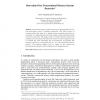Free Online Productivity Tools
i2Speak
i2Symbol
i2OCR
iTex2Img
iWeb2Print
iWeb2Shot
i2Type
iPdf2Split
iPdf2Merge
i2Bopomofo
i2Arabic
i2Style
i2Image
i2PDF
iLatex2Rtf
Sci2ools
102
click to vote
EUROPAR
2007
Springer
2007
Springer
Starvation-Free Transactional Memory-System Protocols
Abstract. Transactional memory systems trade ease of programming with runtime performance losses in handling transactions. This paper focuses on starvation effects that show up in systems where unordered transactions are committed on a demand-driven basis. Such simple commit arbitration policies are prone to starvation. The design issues for commit arbitration policies are analyzed and novel policies that reduce the amount of wasted computation due to roll-back and, most importantly, that avoid starvation are proposed. We analyze in detail how to incorporate them in a TCC-like transactional memory protocol. The proposed schemes have no impact on the common-case performance and add quite modest complexity to the baseline protocol.
Related Content
| Added | 07 Jun 2010 |
| Updated | 07 Jun 2010 |
| Type | Conference |
| Year | 2007 |
| Where | EUROPAR |
| Authors | M. M. Waliullah, Per Stenström |
Comments (0)

